Home | Front Page | Index | Blog | New | Contact | Site Map
Winter
Nazi Terror
Churches
Museums
Prussian palaces
Alte Stadt
Modern Architecture
Shopping
Quirks
Bei Uns (At Home)
Guests
Maps
Pics
Foto Show

Travel 2005
Berlin
Paris
Moscow
Russia
Athens
Travel 2004
Mexico 2004
Belize
Guatemala
Honduras
Costa Rica
Panama
Colombia
Ecuador
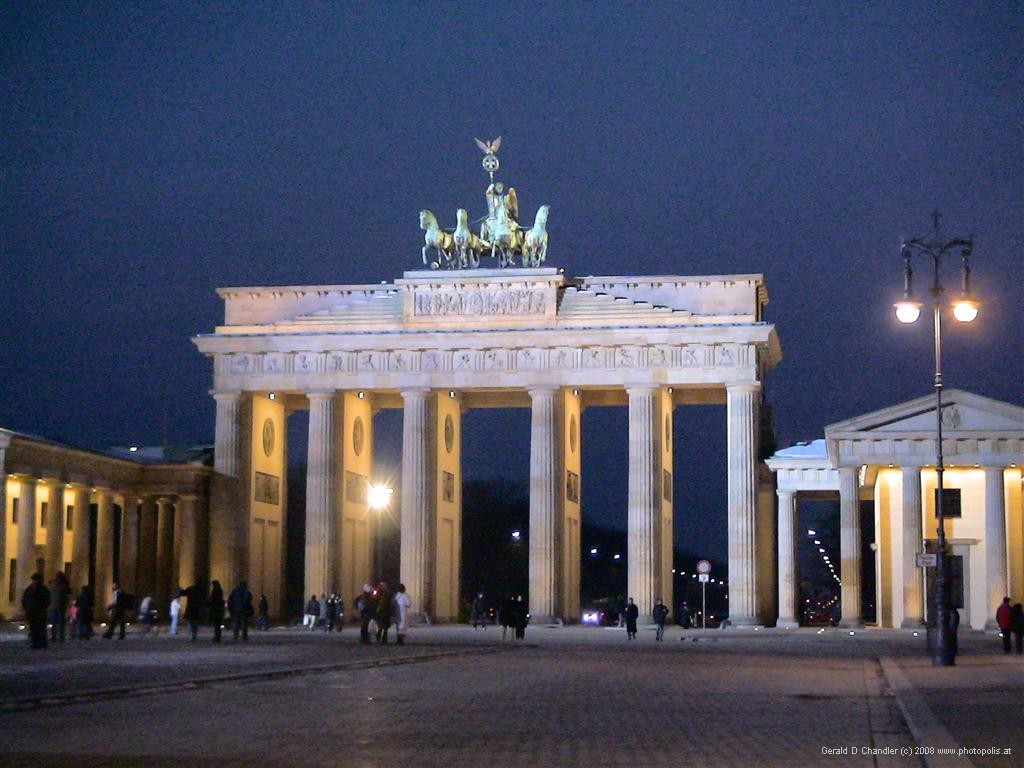
The Brandenburg Gate |
It is probably not very original to start our tour of Berlin with the Brandenburg Gate, but it cannot be helped. It is after all the heart of the new reunited capital city of a reunited Germany. Close by is the Bundestag, the German parliament, re-established in the same building torched by Nazi thugs in the 1930's and left empty during the forty years of the country's schism. A worthy symbol of the rebirth of democracy and the victory over communism.
Maybe it is true as Thomas Wolfe wrote that you can't go home again, but you can go back to Berlin. We had visited Berlin once before, in 1974, in the days of the Berlin wall. Jan was living in Tübingen, south Germany and Gerry was at the Ecole des Mines in Nancy, France. We took a train from Stuttgart to Berlin, spending several hours at the former East-West border waiting for whatever it was that had to be done before we were allowed in. We spent a week as the guest of one of Gerry's friends from graduate school who then had a comfy postion at the Free University. Neither of us remember as much about our visit as we'd like. We want the sounds and tastes to come flooding back, but they don't.
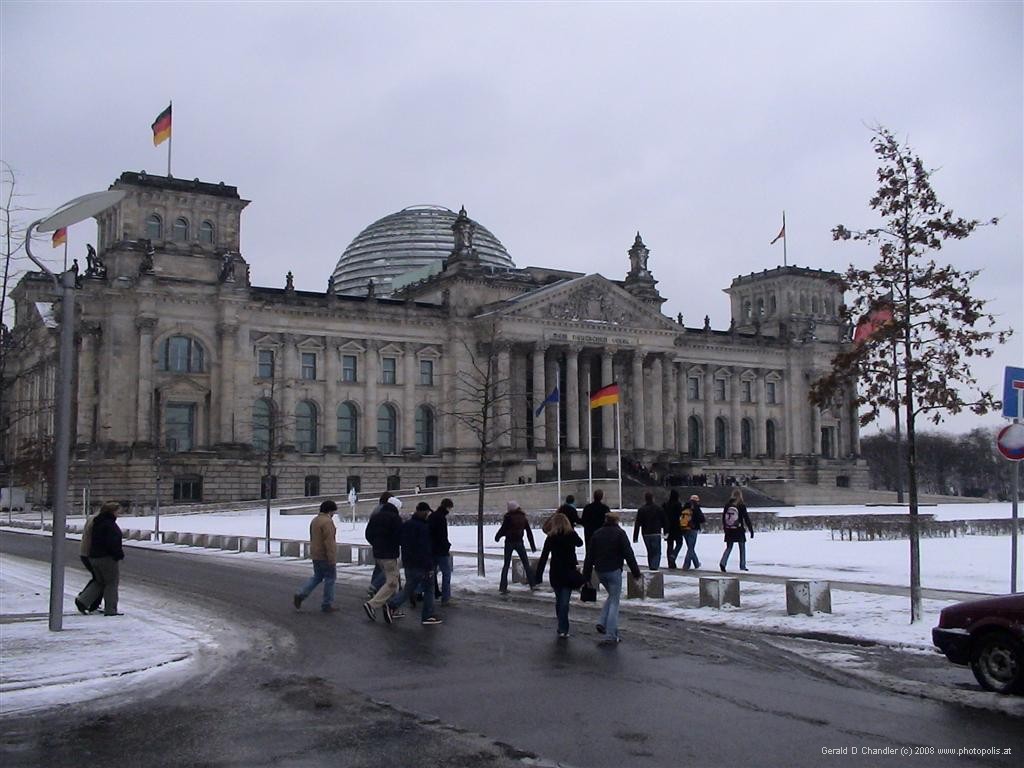
Reichstag with Modern Dome |
We do remember that we wandered along the Ku'damm (short for Kurfürstendamm), the main shopping street of West Berlin, and saw the destroyed Wilhelmsgedächtniskirche; that we went to the Schloss Charlottenburg which then held the head of Nefretiti, and that we stood at a barrier in the Western Sector that separated us and the partially reconstructed Reichstag from the Brandenburg gate, looking very forlorn in the Eastern Sector.
One day we took the U-bahn to the east, coming out of the ground somewhere in or near Unter den Linden. After involuntarily surrendering our International Herald Tribune we walked east along Unter den Linden, past the classical buildings of Humboldt University to some quiet corner where we saw the Berlin Wall from the perspective of those who couldn't leave. There was a grassy strip, about 50 meters, that separated us from the Wall. It was obvious that we should not enter or cross that strip. We'd had to change a minimum amount, perhaps in today's terms $25, and we couldn't find anything on which to spend it. Returning early towards the crossing to West Berlin we discovered, visited, and were thrilled by the Pergamon museum, where we regretted so much having to leave after only an hour there.
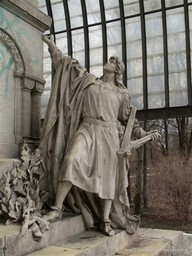
Tomb Figure |
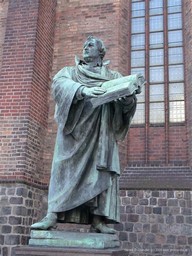
Martin Luther |
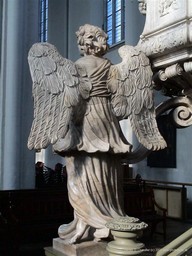
Angel at Marienkirche |
A memory with a lot of gaps, a fallen wall, a transfer of the capital from Bonn, and much new construction and reconstruction meant that we had lots of things to explore in the newly re-united and now capital city of Germany. Although handicapped in our first weeks by heavy colds and snow on the ground for most of our stay, we managed to get to know most of city's museums, castles and a good helping of its wartime history. We made only three out-of-town excursions, but they were really no more than an hour's ride from the center of Berlin: we went to the Prussian Palaces, in Potsdamm, to Wannsee, and to Sachsenhausen. We toyed with the idea of going to Dresden and perhaps even farther afield, i.e. to the part of Germany that is now Poland, but we never ran out of things to do.
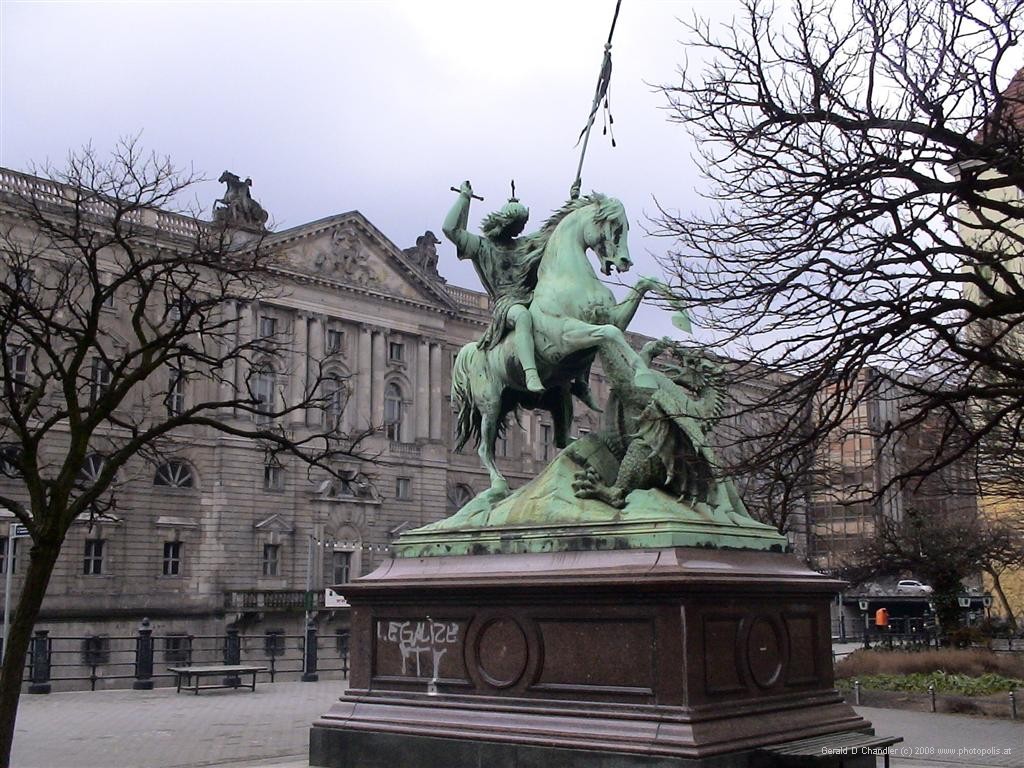
St George Slays the Dragon, Old Berlin Viertelquartier
|
What we liked most about Berlin was the sense of history that surrounded you. What we liked least was the graffiti. It is hard to believe how much graffiti there is. Almost every blank piece of wall is daubed with the stuff, as are all the subways and even the windows of the subway trains are scratched up, often so badly you can hardly see through it. Our guest and friend Mick took great pleasure in spotting bits of graffiti in the most hard-to-reach positions: up on the side of a chimney base, for example, or on the side of a dormer window. Bridges and embankments were easier targets, but nothing seemed off-limits. We didn't understand why the Germans, who always seem to be such a law-abiding people, would subject themselves to such ugliness. Perhaps it is a reaction to the drab existence they had in the DDR? Who knows?
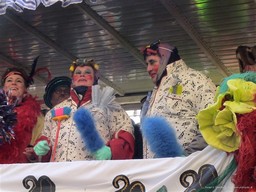
Carnival Participants |
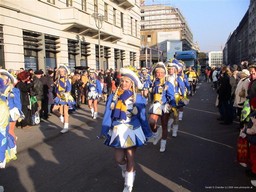
Carnival Marching Band |
Berliners seem to be doing all they can to enliven the city and forget the drab years. There is now one of the biggest "love" (gay) parades in the world. One of our first outings took us to the carnival parade, established just a few years ago. It doesn't match Rio (or even Brooklyn) yet, but watch out world!
Before coming we'd arranged an apartment in which to stay. Or, perhaps we should say that we came because we found an economical apartment. Without it there is no way we could have afforded Berlin. We suffered from price shock with the Euro at $1.33 when we arrived and still at $1.30 when we left -- a shock all the greater because we felt deep down that we were coming from low-priced South America, not medium-priced USA. (We hadn't been in the US long enough to get acclimatized to US prices.) But as our landlord had told us, at the Aldi supermarket (a comfortable walk from "bei uns") we found very good quality food at very reasonable prices and it became our mainstay. Apart from food, Aldi also had a wine section that had remarkably good wines for amazingly low prices. Gerry's favorite was an auslese, a slightly sweet white wine that cost less than €2 (about £1.50 or $2.60) a bottle. Why can't you buy it at that price in New Jersey?
One (among many) reason for coming to Berlin was to improve Gerry's German. Unfortunately our two months here were a very different experience from what we had expected. The main difference was that we spent the entire two months sans (ohne if you're German-speaking!) television. That did wonders for Jan's German reading, but meant that Gerry got less of the German practice that he was looking for. We would even have been without radio had we not bought a cheap radio in one of Berlin's many fleamarkets. Radio was helpful for Gerry's aural comprehension skills, but it didn't make up for television with its added visual cues. We really tried to buy a TV but, believe it or not, it was effectively impossible! Berlin has a digital-cable TV system that we could not master the mysteries of!
Jan on the other hand was happy to get off our plane from London, open her mouth, and find that German came out! She had wondered if she would remember any of her German, learned mostly in Tübingen, South Germany, in 1973-1975. She didn't remember it all, but enough that getting around wasn't really a problem.
Perhaps this is a good time to digress a little and describe one of the most interesting aspects of language learning that she has experienced. Every so often when using one of her foreign languages, she will start a sentence in the foreign language knowing that there is a word in the sentence she doesn't remember. By some kind of magic process, however, at the moment in the sentence when that unknown word is needed it just kind of pops out of her mouth. The first time it happened to her was in Kiev, Ukraine. She hadn't used her Russian for decades and had definite problems dredging her vocabulary from the hidden depths, but every so often this strange process would kick in and at just the right moment a word would pop into her head that she didn't know she knew.